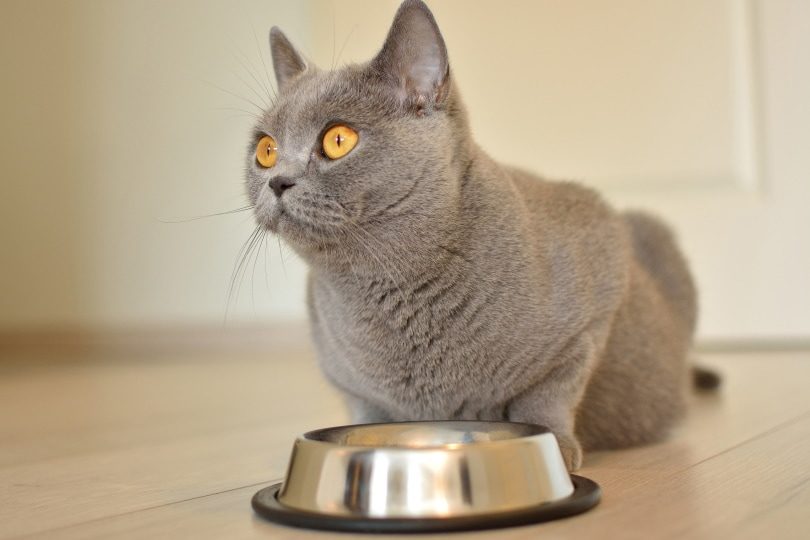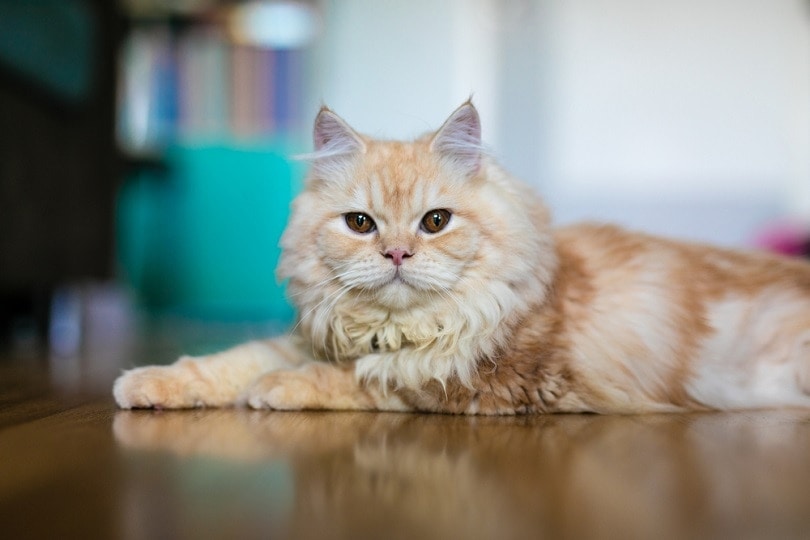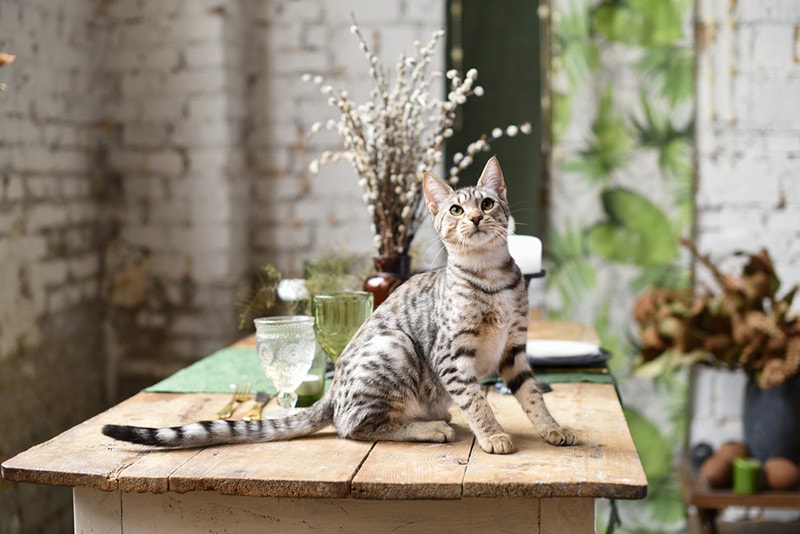Why Does My Cat Fart on Me? 5 Vet-Reviewed Reasons
By Beth Crane
Updated on

Noticing a foul smell from your cat is never a nice thing to experience, but it’s made immeasurably worse when it’s right on your lap! Cats pass gas just like we do; it’s a natural part of the digestive process though is fairly uncommon in cats. However, there are reasons your cat might be farting on you much more often! In this article, we’ll discuss why your cat might be farting on you and what you can do to resolve the issue.
The 5 Common Reasons Your Cat Farts on You
1. Changes in Food
The most common reason for excessive flatulence is digestive issues. Changes in food can upset sensitive and non-sensitive cats, as their intestines react poorly to the new ingredients and don’t have time to adjust.
Your cat’s digestive system adapts to the food they’re usually fed (sometimes for months or years) and can become irritated or upset by the sudden change. This can result in farting and diarrhea, which you don’t want happening when your cat is on your lap!
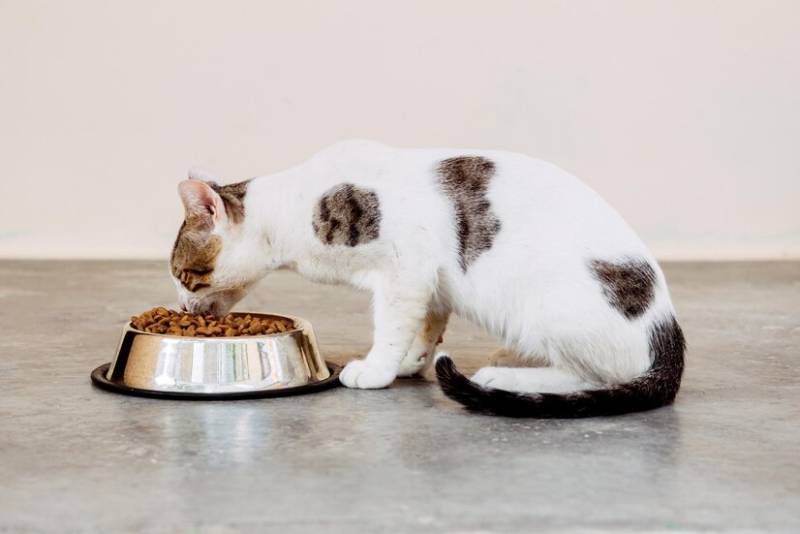
2. Parasites
Another reason why your cat might fart on you is intestinal parasites. Worms such as roundworms, hookworms, and tapeworms are common intestinal parasites in cats, which can cause flatulence and diarrhea (with or without blood).
These parasites are picked up in a variety of ways. Cats can get roundworms from eating infected prey (like mice). Hookworms parasitize cats by burrowing through their skin as larvae, and tapeworm eggs are ingested when cats eat fleas.
Your cat may have any of these parasites if they suddenly start farting on you, but there are usually other signs you can keep a lookout for. These may include:
- Vomiting
- Loss of appetite
- Bloated abdomen
- Anemia
- Lethargy
Other parasites, such as Giardia, can also cause flatulence or diarrhea; your vet should examine your cat when you see any of these signs.
3. Inflammatory Bowel Disease (IBD)
Inflammatory bowel disease (IBD) is a chronic condition affecting the stomach or intestines. Inflammatory cells move into the stomach or intestines and cause thickening of the walls of the organs. This thickening prevents your cat from absorbing all the nutrients they normally would from food or liquid, and the bacterial population of the gut can also change as a result.
This can cause excessive farting, diarrhea, weight loss, and vomiting. IBD can be painful and difficult to manage in your cat, and veterinary treatment should be sought if you suspect your cat could be suffering from it.

4. Microbiome Imbalance
Following on from above, the natural population of bacteria in your cat’s digestive system can become unbalanced when disease is present. Overgrown bacteria in the digestive system can collect in the intestines, which affects their function. Diarrhea, flatulence, and weight loss are all possible signs of a microbiome imbalance; the causes of this imbalance can vary, but some common causes of a microbiome imbalance include:
- Certain medications (e.g. antibiotics)
- Weaning or other life stage changes
- Food scavenging
- Diet changes
5. Allergic or Malabsorption Conditions
Allergies to foods can cause gastrointestinal signs in some cats, such as farting and frequent diarrhea. Animal proteins often cause food allergies, such as chicken, beef, or pork, and can cause skin problems, such as atopy (itching), redness, swelling, and infection. Other health conditions that can similarly affect the intestines are those that cause malabsorption. There is an overlap between food allergies and inflammatory bowel disease in cats; in fact, some may consider them the same condition by a different name.
Malabsorption is when the body poorly absorbs nutrients from food due to a lack of particular enzymes that break the food down. These are made in the pancreas, and the condition is sometimes called pancreatic insufficiency. It can cause flatulence, diarrhea, weight loss, and appetite changes. Malabsorption is usually treated with a multi-faceted approach, including dietary changes and sign management.
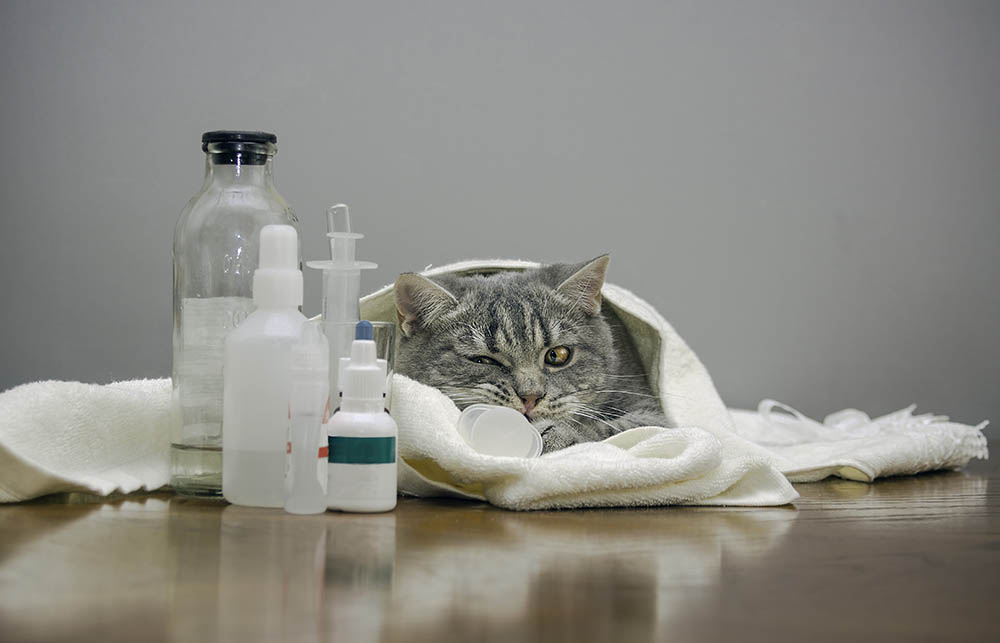
How Do I Stop My Cat From Farting on Me?
If your cat frequently flatulates, identifying the cause is the most important factor. Trying to pinpoint why your cat is farting can be difficult, so looking out for possible triggers, such as changes in food, can help. If your cat is producing lots of gas or is farting and displaying the signs we mentioned above, it’s essential to take them to the vet for an examination.
With veterinary treatments, most causes of cat farts can improve within a few weeks. Dietary changes are usually involved, and sticking to a special diet is crucial.
Why Do Cat Farts Smell So Bad?
Cats are obligate carnivores, and they need animal proteins to survive. Your cat’s digestive system is designed to process these proteins, which can produce potent farts! However, very foul-smelling gas usually indicates a problem in the intestines, such as parasites or disease.
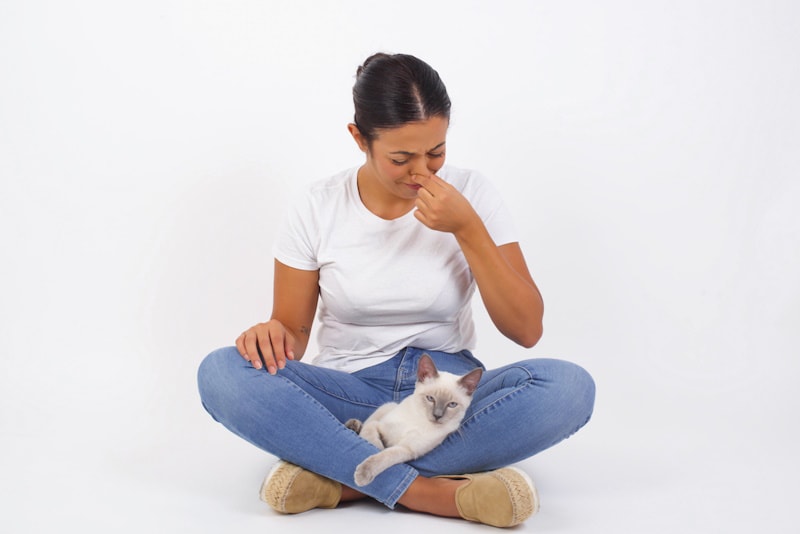
Why Does My Cat Choose Me to Fart On?
You might be perplexed when your cat climbs on your lap and passes gas. However, the reason could be simply that your cat likes to rest on your lap and lets out a fart when they are relaxed! It’s unlikely that your cat is purposefully farting on you, as excessive flatulence is often uncontrolled.
Because they’re likely comfortable with you and relaxed when they rest on you, a fart may slip out. Picking your cat up and placing them on your lap can also cause the movement of gas in the intestines, leading to flatulence! Either way, preventing your cat from sitting on your lap if they’re suffering a period of flatulence can help curb the stinky habit.
Conclusion
Cat farts are never pleasant but are less commonly seen in healthy cats. If you find that your cat is farting on you regularly or the gas is very foul-smelling, it’s likely due to a problem with the digestive system. Parasites, food allergies, malabsorption, imbalances in the microbiome, and IBD are all causes of foul flatulence in cats. Determining the cause of the flatulence is essential since treating the underlying cause is often the only way to prevent your cat from farting on you!
Featured Image Credit: Stanislaw Mikulski, Shutterstock



